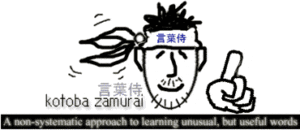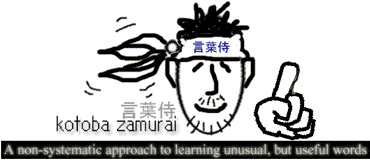Letters to Kotoba Zamurai's Little Brother
The Defender of what is right, the corrector of already correct Japanese, That's right, it's "Letters to Kotoba Zamurai's little brother" time!
正義の味方、すでに正しい日本語をさらに直す者、そうじゃ「言葉侍の弟さんにお手紙を」の時間だ!
seigi no mikata, sudeni tadashii nihongo o sara ni naosu mono, souja "kotobazamurai no otouto san ni otegami o" no jikan da!
Volume 3: Letters to Kotoba Zamurai's Little Brother
| LETTER TO KOTOBA ZAMURAI'S LITTLE BROTHER ・ その1 |
Dear Kotoba Zamurai's little brother, HELP!! I am in dire need of advice. My wife keeps insisting our infant son should be called a "new" ji [Editor's note: it is actually 乳児 nyuu ji which is correct]. Since I want to use correct Japanese and stay away from mixing English I am sticking with "新児 shinji" which seems to be more Japanese-like [Editor's note: but it isn't. If you really want to use 新 try 新生児 shin sei ji for a newborn]. Am I going overboard? Sincerely, |
Answer: 心配バカさんへ,
心配するな! Your struggle is much appreciated. The "shinji-newji wars of '02" were fought over just such a topic. There are countless examples in Japanese where English words are katakana-ized when perfectly good Japanese words could be used instead. For example - 「カメラ」 (Camera) should of course be 「写真とる機械」 and 「テレビ」 (TV) should quite naturally be「無駄な時間を過ごすと分かっても、ばかばかしい番組を見たい機械」. So you see you are not alone in this battle.
One fellow started a "De-katakana-ize Japanese Society", but for some reason once he got a dictionary, his society attendance tumbled from the once lofty number of 1 to 0.
Even still, Keep up the good fight!
言葉侍の弟でした
Editor's Explanation
| 心配するな! shinpai suru na! Don't worry! | Adding な to the end of する makes the phrase negative. It is a bit casual so if you are beginner sticking with the normal way to negate (心配しないで) is much better. But the な method adds a bit of flavor |
| 写真とる機械 shashin toru kikai picture-taking-machine | Once again, our apologies! 写真取る機械 is NOT in current use in Japanese I'm afraid. Please use カメラ. |
無駄な時間を過ごすと分かっても、 ばかばかしい番組を見たい機械 | Yet again, we ask for forgiveness. 無駄の時間を過ごすと分かっても、ばかばかしい番組を見たい機械 is NOT in use. Nor has it even been to my knowledge. Please use テレビ. |
| LETTER TO KOTOBA ZAMURAI'S LITTLE BROTHER ・ その2 |
Dear Kotoba Zamurai's little brother, I've got the basics down, but I want to speak 'cool' Japanese. Can you help? Sincerely, |
Answer: 格好よくない奴さんへ,
心配するな! Speaking 'cool' Japanese is easily done by interjecting endings like 「だぜ!」 or 「だよね!」 or saying 「萌え moe」 for "obsessed with" or 「よ!」 instead of 「こんにちは」
Take this common conversation as an example. Watch how I 'coolify' the words ever so slightly:
[Editor's Note: While the "coolified" Japanese is somewhat in use, it is very casual and should be used only with close friends who know you are a henna gaijin; Actually it really shouldn't be used at all.]
| Normal 'lame' Conversation | Super 'Coolified' Japanese |
| You: こんにちは、鈴木さん。お元気でしたか? konnichi wa, suzuki san. O genki deshita ka? hello-Mr. Suzuki-health-past up until now-(question marker) Hello Mr. Suzuki. How have you been? | You: よ!スーさん。元気か? yo! su-san. genki ka? yo!-Su-healthy-question Yo! Wazup Su? |
| Su-san: ああ、お蔭様で aa, okagesama de... Ah-thanks to you Ah! Great, thanks. | Su-san: ああ、お蔭様で aa, okagesama de... Ah-thanks to you Ah! Great, thanks. |
| You: 最近面白い映画とか見ましたか? saikin omoshiroi eiga toka mimashitaka? recently-interesting-movie-or similar-saw? I have you seen any good movies recently? | You: 最近、超萌えーな映画見たかい? saikin, chou moe- na eiga mita kai? recently-like so-groovy-movie-saw Like, have you seen a way cool flick recently? |
| Su-san: そうですね。最近歴史的な番組はテレビでみています。 sou desu ne. saikin rekishi teki na bangumi wa terebi de miteimasu. That's right (said when thinking)-recently-historical-program-on TV-seeing Well, recently I have been watching shows on historical subjects on TV. | Su-san: そうですね。最近歴史的な番組はテレビでみています。 sou desu ne. saikin rekishi teki na bangumi wa terebi de miteimasu. That's right (said when thinking)-recently-historical-program-on TV-seeing Well, recently I have been watching shows on historical subjects on TV. |
| You: いいですね。さすが教育的な鈴木さんですね。 ii desu ne. Sasuga kyouiku teki na suzuki san desu ne. Good-it is-Just like you-educational-Suzuki-isn't it Sounds neat. That's just like you to be so educated minded. | You: 実に萌えーだぜ!スーさんって、超頭いい奴な。 jitsu ni moe daze! susantte, chou atama ii yatsu na. really-awesome-is emphatic-Su-san-as for-like so-head-good-fellow That's like totally bogus man! Su, you Einstein you! |
| Su-san: まあ、それでは、ちょっと行かなければならないところがありますので。 maa, sore dewa, chotto ikanakereba naranai tokoro ga arimasu node. Kind of-Well, then-little-have to go-place-(subject marker)-exists-therefore Kind of. Well, I have something to tend to and must be going. | Su-san: まあ、それでは、ちょっと行かなければならないところがありますので。 maa, sore dewa, chotto ikanakereba naranai tokoro ga arimasu node. Kind of-Well, then-little-have to go-place-(subject marker)-exists-therefore Kind of. Well, I have something to tend to and must be going. |
| You: それじゃ、またね。 sore ja, mata ne. Well then-again See you, then. | You: バイならだぜ! bai nara daze Bye-ending of sayouNARA-is emphatic Later dude. |
So you see just by applying a few 'coolified' grammatical tricks, one can instantly become "Mr. Cool"
Just to be safe, don't use these words to your father-in-law,
言葉侍の弟でした
Editor's Explanation
| 萌え moe be overly fond of something | Popularized by Internet chat rooms, message boards and the TV show 電車男 densha otoko, moe is used by otaku types but if you say it to the average Japanese, you may get a blank stare unless they watched densha otoko! |
| 超・・・ chou very | slang for とても - 超大きい chou ookii - very big |
| バイなら bainara Bye | Bye + Sayounara |
| LETTER TO KOTOBA ZAMURAI'S LITTLE BROTHER ・ その3 |
Dear Kotoba Zamurai's little brother, I wanna be a ninja but I am against violence. What should I do? Sincerely, |
Answer: 隠れ忍者さんへ、
心配するな! This problem is actually more prevalent than normally reported. Look in your phone book for a local 非暴力忍者クラブ (look under "hi"). Talking to others in a similar predicament is often helpful. Me, well, I appreciate a good slap on the wrist occasionally. Must be the samurai blood in me. Even still, I feel for your problem.
Anyway, to help give you practical advice here are a few common remedies:
- As mentioned above seek out other nonviolent ninjas
- Buy a ton of Nerf throwing stars (やわらかい手裏剣) - Don't get just one. They get all soggy and don't throw worth a flip in the rain. And you know as a ninja you will spend a lot of time in the outdoors.
- Buy a hot pink (if you are a lady ninja くのいち) ninja suit or a pukey green one (if you a man) - sorry I couldn't tell by your nickname. I can't tell you how often people have written back to me saying just how helpful this piece of advice was. I mean, I don't care how nasty of a fellow you run across; who would want to attack someone in a pink or pukey green outfit? Really.
- Work on a goofy smile under your mask. As a ninja you will of course have to 'look' mean, but that doesn't mean you have to 'feel' mean.
- At the end of the day, call all your 'enemies' (whether they be opposing daimyos or common assassins) for a great, big group hug. This way no one's feelings get hurt.
Oh, and don't worry too much about training. By following my recommendations the chance of you actually needing any fighting skills is next to nothing.
言葉侍の弟でした
Editor's Explanation
| 隠れ忍者 kakure ninja hidden ninja | Also see 隠れファン |
| 非暴力忍者クラブ hibouryoku ninja kurabu Anti-Violence Ninja Club | I am not sure exactly what he is talking about. I looked through all the "hi's" and couldn't find a single reference to this club. Of course I do live in a small town... |
| やわらかい手裏剣 yawarakai shuriken soft throwing star | I suppose this may exist. Go by your local Nerf store and see... |
| くのいち kunoichi Female Ninja | This is actually an interesting word. If you look at the kanji for woman 女 and draw it out, you start with く then the katakana ノ and then finally 一 (ku+no+ichi) |
Editor's Final Apology
While accuracy in reporting is our number one objective, pulling people's leg may occasionally trump accomplishing our number one objective. It kind of depends on our mood and the position of the moon. Still, as they say in Japanese - there is no excuse - 申し訳ございませんでした。






